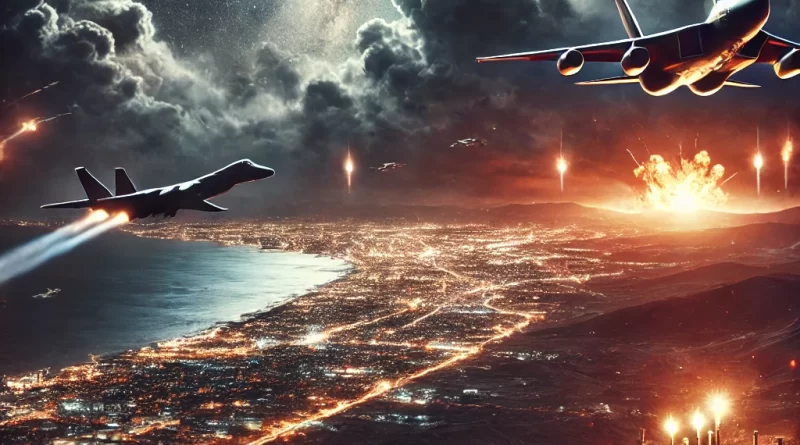Israel-Iran Conflict: An In-Depth Look into the Growing Tensions
The conflict between Israel and Iran is one of the most significant and long-standing geopolitical struggles in the Middle East. It has garnered international attention due to the deep historical, ideological, and geopolitical layers that define this conflict. What began as a rivalry has escalated into a proxy war, cyber-attacks, espionage, and direct military confrontations that have the potential to destabilize the entire region.
This article delves into the historical background, the reasons behind the current conflict, the key players involved, and the potential future outcomes, all while exploring the broader international ramifications of this complex geopolitical struggle.
1. Historical Background: Roots of the Conflict
The animosity between Israel and Iran did not always exist. In fact, prior to the Islamic Revolution in 1979, the two nations maintained diplomatic ties, and Iran was one of the few majority-Muslim countries to recognize Israel. However, the revolution marked a drastic shift in Iran’s foreign policy, as the new Islamic regime under Ayatollah Khomeini denounced Israel, labeling it the “Zionist regime” and positioning itself as a champion of the Palestinian cause.
Key Turning Points:
1979 Islamic Revolution: Iran’s new theocratic regime rejected Israel’s legitimacy and severed diplomatic ties.
Lebanon Conflict (1982): Iran’s involvement in the Lebanon war through its support of Hezbollah marked the start of Iran’s direct confrontations with Israel.
Nuclear Ambitions (2002-Present): The discovery of Iran’s nuclear program in the early 2000s escalated tensions. Israel views Iran’s nuclear ambitions as an existential threat, while Iran insists its program is for peaceful purposes.
2. The Key Drivers of the Conflict
Iran’s Ideological Opposition to Israel
Iran’s regime is rooted in the idea of exporting its Islamic Revolution and resisting Western imperialism. Israel, seen as a close ally of the U.S. and as an occupier of Palestinian lands, became a focal point of Iran’s anti-Western rhetoric. Iran’s leaders have repeatedly called for Israel’s destruction, which deepened the animosity between the two nations.
Israel’s Security Concerns
Israel perceives Iran as a threat to its existence due to Tehran’s support for anti-Israel militant groups like Hezbollah in Lebanon, Hamas in Gaza, and its involvement in Syria. Iran’s growing influence in neighboring countries through proxies and its development of long-range missiles pose significant security risks to Israel.
Nuclear Weapons
Iran’s nuclear program has been the most significant flashpoint. Israel insists that a nuclear-armed Iran would alter the balance of power in the region and make the Islamic Republic more dangerous. Despite efforts by the international community, including the Iran nuclear deal (JCPOA) in 2015, Israel remains skeptical and has taken covert actions to halt Iran’s nuclear ambitions, including alleged cyberattacks and the assassination of key Iranian scientists.
3. The Current State of the Conflict
The conflict between Israel and Iran in recent years has manifested in several forms, including proxy wars, airstrikes, covert operations, and cyber-attacks. Here’s an overview of the key developments:
Syria as a Battleground
Syria has become the epicenter of the Israel-Iran conflict. During the Syrian civil war, Iran has sent thousands of troops, military advisors, and weapons to support the Assad regime. Israel, in turn, has carried out hundreds of airstrikes targeting Iranian assets in Syria, including weapons depots, military bases, and supply convoys. Israel fears that Iran is trying to establish a permanent military presence near its borders.
Hezbollah and Hamas
Iran’s support for Hezbollah in Lebanon and Hamas in Gaza has led to repeated confrontations with Israel. Hezbollah, which has a large stockpile of rockets, is considered a significant threat to Israel’s northern borders. Hamas, backed by Iran, also receives funds and weapons that are used against Israel in the ongoing conflict in Gaza.
Covert Operations and Espionage
Both countries have engaged in covert operations. Israel has allegedly conducted assassinations of Iranian nuclear scientists and cyber-attacks on Iran’s nuclear facilities, including the infamous Stuxnet attack. Iran has retaliated by targeting Israeli diplomats and assets worldwide, as well as launching cyber-attacks on Israeli infrastructure.
4. The Global Impact and International Reactions
The Israel-Iran conflict is not limited to the two countries; it has global ramifications due to the involvement of major powers like the United States, Russia, and European nations. The U.S. has been a key ally of Israel, providing it with military aid and diplomatic support, particularly in its efforts to prevent Iran from acquiring nuclear weapons.
U.S. Role
The United States has played a crucial role in shaping the conflict. Its withdrawal from the JCPOA in 2018 under President Donald Trump and the imposition of heavy sanctions on Iran increased tensions in the region. President Joe Biden’s administration has sought to renegotiate the nuclear deal, but Israel remains opposed to any agreement that does not fully dismantle Iran’s nuclear capabilities.
European Union
The European Union has been more in favor of diplomacy and has tried to mediate between Iran and Israel, particularly through its support for the JCPOA. However, Israel’s airstrikes on Iranian positions in Syria and Lebanon, along with Iran’s increasing regional influence, have made it difficult to find a peaceful resolution.
Russia’s Role
Russia, a key ally of both Iran and the Assad regime in Syria, has allowed Iran to maintain its presence in the country while balancing its relations with Israel. Russia’s involvement has added another layer of complexity to the conflict, as it attempts to mediate between the two without fully committing to one side.
5. The Potential for Escalation
The possibility of a direct war between Israel and Iran remains a concern for the international community. While both countries have avoided a full-scale confrontation so far, several scenarios could lead to a direct war:
Iran’s Nuclear Breakout
If Iran were to achieve nuclear weapons capability, Israel may feel compelled to carry out preemptive strikes to destroy Iranian nuclear facilities. Such an action could trigger a large-scale regional war.
Proxy War Escalation
The conflict between Israel and Iran’s proxies, particularly Hezbollah, could lead to a wider war. Hezbollah’s missile arsenal and Israel’s determination to prevent Iran from entrenching itself in Syria have raised concerns of a future conflict that could involve Lebanon, Syria, and potentially even other nations in the region.
Cyber Warfare
Both countries have advanced cyber capabilities and have engaged in cyber-attacks against each other’s infrastructure. A large-scale cyber-attack could lead to significant damage, causing political instability and pushing the two nations closer to war.
6. Possible Outcomes: War or Diplomacy?
There are several possible future scenarios for the Israel-Iran conflict:
Diplomatic Solution: A diplomatic breakthrough could be achieved if both nations, with the help of international actors, agree to a peace deal or security arrangement that addresses Israel’s concerns about Iran’s nuclear ambitions and regional influence.
Prolonged Proxy Conflict: The most likely outcome is the continuation of proxy wars in Syria, Lebanon, and Gaza, with both countries avoiding direct confrontation but continuing to engage in covert operations and limited military strikes.
Full-Scale War: In the worst-case scenario, the conflict could escalate into a full-scale war, particularly if Iran acquires nuclear weapons or if Israel decides to carry out a preemptive strike.
Conclusion
The Israel-Iran conflict is a deeply rooted and multifaceted struggle that has far-reaching consequences for the Middle East and the world. With no clear end in sight, the region remains on edge as both countries continue to engage in military, cyber, and proxy battles. The international community, particularly the United States, Russia, and European nations, will play a crucial role in determining whether the conflict escalates or whether a diplomatic solution can be found to bring stability to the region.




